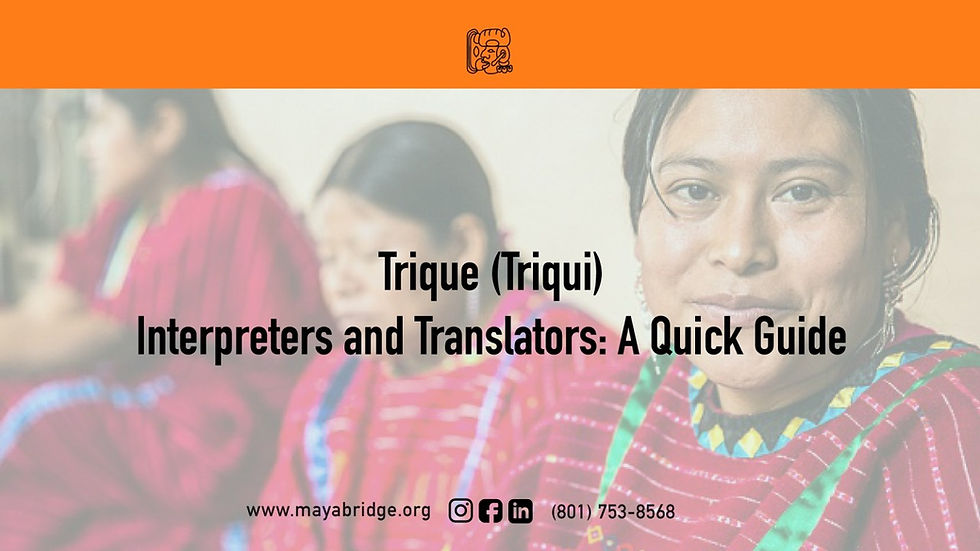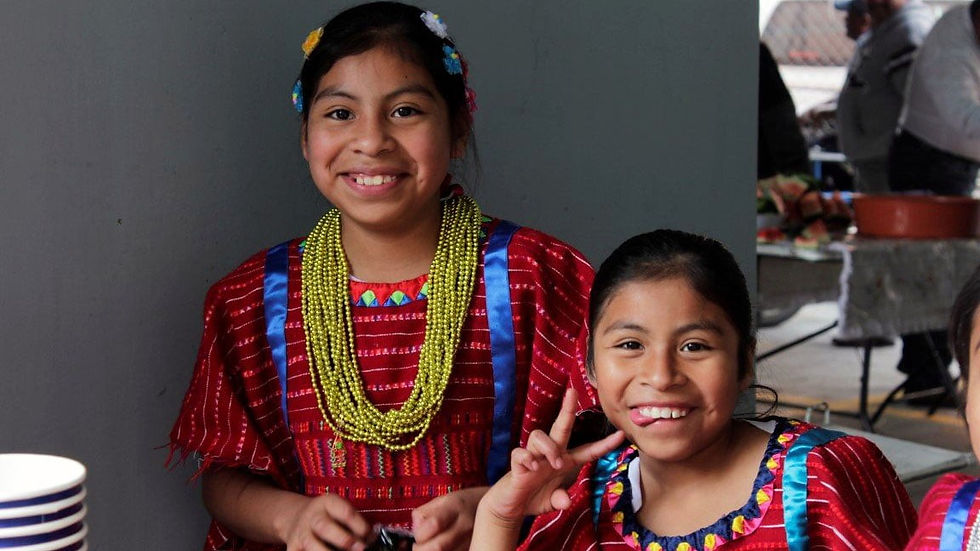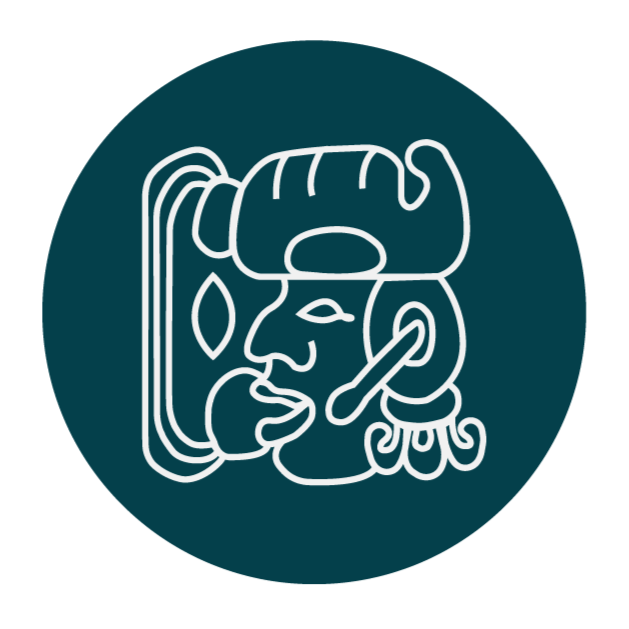Trique (Triqui) Interpreters and Translators: A Quick Guide
- valeriamarchese2
- 11 minutes ago
- 4 min read

As the Trique people increasingly migrate to the United States for safety, economic opportunities, and a better quality of life, language access is one of their biggest obstacles. This is where Trique interpreters step in and help migrants integrate safely into their new surroundings.
For the Trique, whose cultural and linguistic heritage has stood the test of time, interpreters play a major role in bridging the gap between their traditional ways of life and the challenges of modern migration.
This blog explores the Trique language, why the Trique are migrating, and the support interpreters can provide them as they settle in the United States.

Who speaks Trique (Triqui)?
Trique, also known as Triqui is a family of languages spoken by the Trique people of Mexico. Primarily spoken in Oaxaca, this language group is also spelled Triki and Trike. Approximately 40,000 people speak it.
The Trique languages belong to the Mixtecan branch of the Oto-Manguean language family, along with Mixtec and Cuicatec. Mexico’s Instituto Nacional de Lenguas Indígenas (National Indigenous Languages Institute) recognizes four variants. Each variant corresponds to a different geographical region in the Trique region and has its own distinct characteristics.
In the sixteenth century, the Trique population was small, estimated at fewer than 2,000. They lived in the mountainous regions of Oaxaca, and remained autonomous despite being surrounded by larger Mixtec communities. Thanks to this secluded location in rugged, less fertile terrain, they were also able to maintain their cultural identity during Spanish colonization.
Their economy began to change in the early 20th century, particularly with the introduction of coffee cultivation in lower-altitude areas. They began advocating for land rights and self-governance in the 1970s, which ultimately gave rise to the Movement for Trique Autonomy in 1975. Despite their push for independence, government resistance led to violent conflicts and mass displacements.
In 2007, the Trique people took a bold step by declaring autonomy and establishing self-governing structures. Paramilitary groups responded with violence, forcing many residents into exile. To this day, the Mexican government has not officially recognized their declaration of autonomy.
Why are the Trique (Triqui) migrating?
Since the 1970s, political conflicts and civil unrest have destabilized the Trique region and forced out entire communities. Their ongoing fight for autonomy has resulted in violence and mass displacement, preventing countless families from returning to their ancestral lands.
Trique men initially migrated seasonally for temporary farm labor, but the region’s deteriorating living conditions have led families to relocate permanently. By the 1990s, Trique families were fleeing poverty and political violence, particularly to California. This movement accelerated throughout the 1990s. In the early 2000s, violence intensified and led to larger waves of permanent migration. While some continued to seek agricultural employment opportunities, the majority fled the escalating violence.
The Trique region remains one of Mexico's poorest regions, with few job opportunities and low wages. Trade policies like the North American Free Trade Agreement (NAFTA) further weakened rural economies by making traditional crops like corn unprofitable. Since then, many Trique families have been forced to abandon their ancestral lands to find economic opportunity elsewhere.

The Roles And Importance Of Trique (Triqui) Interpreters
Trique interpreters help migrants to express themselves and understand the information they are given, allowing them to better advocate for themselves and make more informed decisions.
Interpreters act as trusted guides for Trique migrants, guiding them through the complex U.S. immigration system, and helping them get access to medical, legal, and social services. In settings like doctor's appointments, immigration proceedings, and court hearings, qualified Trique interpreters are indispensable.
Besides providing language assistance, interpreters are also integral to intercultural communication. Having an interpreter who understands both American and Trique cultures can help make communication smoother and less stressful for both sides.
The shortage of qualified Trique interpreters can be attributed to several factors. With multiple variants of Trique, finding an interpreter for a specific one can be challenging. Trique-speaking communities are concentrated in certain U.S. regions, limiting interpreter availability elsewhere. Additionally, the lack of formal training programs hinders potential interpreters from qualifying for healthcare and legal positions that require certification.
Without interpreters, Trique speakers cannot access basic services like healthcare, legal assistance, and social support. Language barriers can also lead to medical misdiagnosis, unjust asylum rulings, and wrongful deportations.
For vulnerable populations like the Trique, providing qualified interpreters isn't just a matter of convenience. It's part of their right to language access in the U.S., and can mean the difference between safety or danger, justice or injustice, and even life or death.
Work With A Trique (Triqui) Interpreter from Maya Bridge
At Maya Bridge, we offer language services for Trique and all of its variants to provide your organization with comprehensive linguistic support. Since 2021, we have provided Trique to English interpretation to countless government agencies, healthcare organizations, and courts. As a small, niche interpretation agency specializing in Latin American Indigenous languages, we are uniquely equipped to offer on-demand Trique interpretation, 24 hours a day.
We offer:
Video Remote Trique (Triqui) Interpretation
Over-the-phone Trique (Triqui) Interpretation
In-person Trique (Triqui) Interpretation
Court-certified Trique (Triqui) Interpretation
Medical-certified Trique (Triqui) Interpretation
Trique (Triqui) Translation
Trique (Triqui) Voiceover and Subtitles
Learn more about our language services here.
Maya Bridge - A Leading Advocate For Latin American Indigenous Language Access In The U.S.
Since 2021, Maya Bridge Language Services has been advocating for increased access for speakers of Mayan and other Latin American and global Indigenous languages here in the United States. Maya Bridge is a mission-driven, niche interpretation agency offering 24/7 on-demand services for over 100 Indigenous languages from Latin America, as well as African, Asian, Pacific Island, Native American, and other Indigenous languages.
We have worked diligently to mobilize, train, and evaluate a network of hundreds of interpreters both in the U.S. and throughout the world to ensure that speakers of Indigenous languages can fully understand and be understood in important situations like healthcare, legal settings, in disaster and emergency response scenarios, and in receiving access to government programs.
Contact us to schedule a meeting or call us anytime, day or night, at (801) 753-8568.


Comments